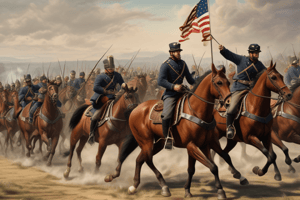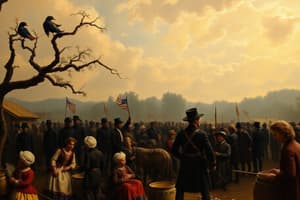Podcast
Questions and Answers
What was the primary reason for the southern states' secession from the Union?
What was the primary reason for the southern states' secession from the Union?
- The desire for economic independence from Northern states
- Conflicts over state rights versus federal authority
- Discontent with federal taxes imposed by the Union
- Fear of losing slavery due to Lincoln's anti-slavery stance (correct)
What significant action did Abraham Lincoln take regarding Fort Sumter?
What significant action did Abraham Lincoln take regarding Fort Sumter?
- He declared war on the southern states after the attack on it (correct)
- He sent reinforcements to protect the fort from attack
- He conducted peace negotiations to prevent further conflict
- He ordered the fort to be surrendered to Confederate forces
What was the Emancipation Proclamation?
What was the Emancipation Proclamation?
- A military order to recruit African American soldiers
- A document freeing slaves in the northern states
- A treaty to end the Civil War
- A declaration freeing slaves in the southern states (correct)
What was the outcome of the Battle of Gettysburg?
What was the outcome of the Battle of Gettysburg?
How did Lincoln respond to the Confederate blockade of Southern ports?
How did Lincoln respond to the Confederate blockade of Southern ports?
What was a result of the Civil War that occurred in 1865?
What was a result of the Civil War that occurred in 1865?
What major event followed the final submission of the southern states in 1865?
What major event followed the final submission of the southern states in 1865?
What was the significance of Lincoln's Gettysburg Address?
What was the significance of Lincoln's Gettysburg Address?
What was the primary economic activity in the Southern states after gaining independence?
What was the primary economic activity in the Southern states after gaining independence?
What role did slaves play in the Southern economy?
What role did slaves play in the Southern economy?
What was a significant difference in labor needs between the Northern and Southern states?
What was a significant difference in labor needs between the Northern and Southern states?
Which movement in the North was opposed to slavery?
Which movement in the North was opposed to slavery?
What tax-related dispute contributed to the tension between the North and South?
What tax-related dispute contributed to the tension between the North and South?
What controversy arose regarding the admission of new states into the USA?
What controversy arose regarding the admission of new states into the USA?
What aspect of social justice was a primary concern during the time leading to the Civil War?
What aspect of social justice was a primary concern during the time leading to the Civil War?
What outcome did the North desire regarding slavery in the Southern states?
What outcome did the North desire regarding slavery in the Southern states?
Flashcards are hidden until you start studying
Study Notes
Divergence Between Northern and Southern States
- After independence in 1776, northern and southern states of the USA evolved differently.
- Northern states included regions north of Pennsylvania; southern states encompassed areas south of Maryland.
- Southern economy was predominantly agricultural, relying on plantations for crops such as cotton, rubber, and tea.
- Slave labor was essential for Southern plantations, leading to reliance on slavery and slave trade.
Industrial Revolution in the North
- Between 1815 and 1860, the Northern states underwent an industrial revolution.
- Development of large factories, urban centers, and thriving commerce characterized the North.
- Factories required skilled, wage-earning workers rather than slaves; this fostered an anti-slavery movement.
Tensions Leading to Civil War
- Disputes over slavery were significant factors causing the American Civil War.
- Slavery represented a major social justice issue, with slaves denied basic rights, property ownership, and the ability to establish family life.
- Economic conflict arose from tariff policies; northern states supported protective tariffs, while southern states opposed them due to increased import costs.
Admission of New States
- Controversy over whether new states (Texas, New Mexico, California) would be free or slave-owning exacerbated tensions between North and South.
Abraham Lincoln's Election and Southern Secession
- Abraham Lincoln's election in 1861 sparked fears in the South regarding slavery abolition; he was known for his anti-slavery stance.
- Southern states, led by South Carolina, seceded to form the Confederate States of America in 1861, opposing Lincoln's commitment to the Union.
Outbreak of Hostilities
- The bombardment of Fort Sumter by Southern forces in 1861 marked the beginning of armed conflict, leading Lincoln to declare war.
- Lincoln ordered a naval blockade of Southern ports to restrict trade and supply routes.
Emancipation Proclamation
- In 1862, Lincoln issued the Emancipation Proclamation, officially freeing slaves in Confederate states, aiming to weaken the South's war efforts.
Key Battles and Turning Points
- The Battle of Gettysburg (June 1863) was a pivotal encounter; it resulted in over 45,000 casualties, with Confederate General Robert E. Lee forced to retreat.
- Lincoln delivered the Gettysburg Address during the cemetery dedication, reinforcing the struggle for unity and freedom.
Conclusion of the War
- General Ulysses S. Grant attacked the Confederate army in 1864, ultimately leading to the Southern submission in 1865.
- The Civil War concluded with the abolition of slavery and preservation of the Union.
Effects of the Civil War
- Official abolition of slavery across the USA in 1865.
- Preservation of national unity amid extensive destruction in the South.
- Initiation of the Reconstruction Period to restore and develop the damaged Southern states.
Studying That Suits You
Use AI to generate personalized quizzes and flashcards to suit your learning preferences.




